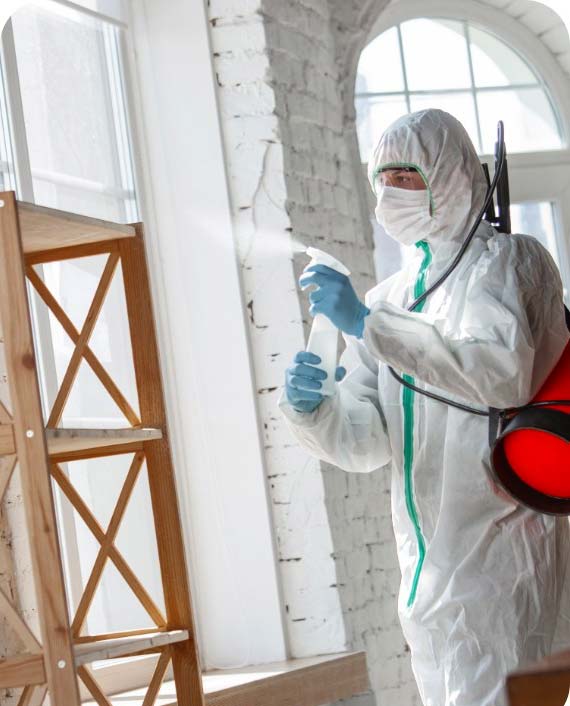In Montana, insufficient moisture significantly contributes to averting issues related to mold. However, excessive humidity can lead to the formation of mold in residences throughout the state. Who bears the responsibility for addressing these mold issues?
Montana does not have a state law indicating that landlords should clean the mold. However, landlords must provide a habitable home to their tenants. They are also required to disclose knowledge of mold in the home.
Thus, the responsibility implies that the landlord will fix mold problems before the home is leased and when they appear in their tenant’s homes.

What we cover
ToggleLandlord rights and responsibility for mold in Montana
- The landlord must disclose the presence of mold in the home if they know about it.
- Mold remediation before new tenants occupy the house.
- Make repairs and do whatever is necessary to make the home fit to live.
- Fix leaking pipes and any water damage that can provide a conducive environment for mold growth.
- Provide a copy of mold test results and evidence of treatment or mitigation.
- Provide smoke detectors
- Inform the tenant of the location and address of the landlord or tenant.
Resource: See other states mold laws here
Tenants rights and responsibility in Montana
- Pay rent and utilities as agreed upon.
- Comply with all city and county requirements
- Keep the house clean and sanitary.
- Dispose of all waste and garbage as required.
- Maintain smoke detectors
- Operate all electrical and plumbing appliances appropriately.
- Keep the peace with neighbors.
- Do not damage the property.
- Do not change the locks without the landlord’s consent.
How long does the landlord have to fix a mold problem?
Tenants should notify their landlord when a mold problem occurs in their homes. A phone call, letter, and photo evidence of the problem is an effective notification of the problem to the landlord or their agent.
The landlord has 14 days to fix the mold problem when they receive the notification.
If the fourteen days lapse without a response from the landlord, the law allows a tenant to fix the problem and deduct the amount paid for repairs from the rent. In Montana, tenants are allowed to do this if the cost of repairs is less than the cost of monthly rent.
Mold disclosure law in Montana
Montana passed the Mold Disclosure Act in 2003. It requires landlords and property sellers in Montana to disclose the presence of mold if it is known.
The landlord and seller of the home must provide in writing a mold disclosure statement. For landlords, it is indicated on the lease documents.
Disclosure documents are available for property sellers to use.
Additionally, landlords and sellers must disclose the results of mold tests conducted on the house.
Can you break the rental lease in Montana due to mold?
Breaking your lease is the last option.
You are allowed to break the rental lease in Montana due to mold under the following conditions:
You did not cause the mold problem
As a tenant, if you cause a problem in your home, the law does not allow you to deduct the repair cost from your rent, withhold rent or break your lease.
When you spot leaking pipes or water damage, notify your landlord immediately. If you fail to report when the problem is small, it can be construed to be your fault if you report when the problem is too big.
Always keep records of your conversation with the landlord when you report the matter. Report small mold problems to your landlord in writing before they become a big problem.
Your landlord has refused to fix the mold problem
If your landlord does not fix the mold problem after reporting it and providing ample time to fix it, you can break your lease.
If your home is not habitable and the landlord does not respond to your request to fix it, breaking your lease and moving out is known as constructive eviction. You can move out of your house without owing the rest of the rent in the lease period.
To prove constructive eviction, you must have evidence that you notified your landlord of the problem and that they did not fix it. You must also prove that the house was not habitable at the time you moved out.
Can a Montana tenant seek justice in court?
You can sue your landlord for the following reasons.
- Discrimination.
- Your landlord does not return your security deposit. However, your landlord can hold your deposit for non-payment of rent or use it to pay to fix any damage you made to the house. Or, to clear any utility bills you left pending.
- When your home is uninhabitable. If the home is unsafe and unlivable from mold or another problem and your landlord has refused to fix it, you can sue them.
- Interferes with your right to quiet enjoyment. Once you sign the rental lease, the landlord should allow you the freedom to enjoy the property in peace. They should always give notice if they want to access the property
- Wrongful eviction.
- When you get injured at the property.












